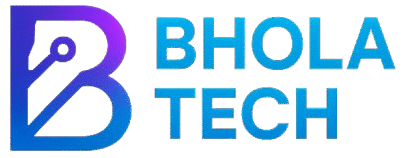📌 Bhola Tech Desk:
In recent discussions surrounding the future of technology, one name that stands out is Vinod Khosla, a prominent Silicon Valley venture capitalist. His insights into artificial intelligence (AI) and its potential impact on various sectors, particularly education and healthcare, are both intriguing and thought-provoking. Khosla’s predictions suggest that AI will not only revolutionize the job market but also make essential services nearly free. Let’s dive deeper into his predictions and explore what they mean for the future.
🔍 The AI Revolution: Job Market Transformation
Khosla has made bold claims about the future of work, suggesting that AI could take over 80% of jobs that humans currently perform. This assertion, while alarming to many, is rooted in the belief that AI will create new opportunities even as it automates existing roles.
Imagine a world where mundane tasks are handled by machines, allowing humans to focus on more creative and fulfilling work. Khosla argues that by 2040, the need for traditional employment will diminish significantly. People will work not out of necessity but out of desire, fundamentally changing our relationship with work.
The Shift in Job Dynamics
This shift raises several questions:
- What types of jobs will remain?
- How will education adapt to prepare future generations?
Khosla emphasizes that while many current jobs will be automated, new roles will emerge that require human creativity and emotional intelligence-skills that AI cannot replicate. This transition will necessitate a rethinking of our educational systems to focus on developing these uniquely human traits.
💡 Advice for Aspiring Entrepreneurs
For young entrepreneurs looking to navigate this changing landscape, Khosla offers valuable advice: “Choose a problem that is genuinely valuable to solve.” He encourages aspiring business owners to pursue ideas that inspire them rather than merely chasing trends.
In an era where AI simplifies implementation, the real value will lie in bold and innovative ideas. Entrepreneurs should focus on creating solutions that address significant societal challenges, as these will be the ventures that thrive in the AI-driven economy.
Embracing a Generalist Approach
When asked whether students should specialize or adopt a broader perspective, Khosla advocates for a generalist approach. He believes that AI will excel in narrow, specialized tasks, making it crucial for individuals to cultivate a diverse skill set. Curiosity and adaptability will be the most valuable assets in the coming decade.
⚙️ The Future of Education and Healthcare
One of Khosla’s most striking predictions is that AI will make education and healthcare nearly free within the next 25 years. He envisions a world where individuals can access top-tier medical advice and education without financial barriers.
The Implications of Free Services
Imagine a scenario where anyone can consult with the best doctors or learn from the most esteemed educators without worrying about costs. This democratization of knowledge and healthcare could lead to a healthier, more educated society.
Khosla’s vision hinges on the idea that AI will drastically reduce the costs associated with these services, making them accessible to all. This could be a game-changer, particularly for underserved communities that have historically lacked access to quality education and healthcare.
📱 Opportunities for Smaller Cities
Khosla also highlights the potential for AI to decentralize opportunities, particularly for smaller cities that have been overlooked in the past. He believes that AI will extend opportunities beyond major urban centers, benefiting those in regions that previously lacked access to networks and education.
The Rise of Local Innovation
This shift could lead to a surge in local innovation, as individuals in smaller towns leverage AI to create solutions tailored to their communities. The potential for growth in these areas is immense, and Khosla’s insights suggest that the future may be brighter for those outside the traditional tech hubs.
🧪 Long-term Performance and Practical Buying Advice
As we look ahead, it’s essential to consider how these predictions will affect consumer behavior and technology adoption. For instance, if education and healthcare become more affordable due to AI, we may see a shift in how individuals prioritize spending.
Investing in AI-Driven Solutions
For consumers and investors alike, this presents an opportunity to explore AI-driven solutions that enhance everyday life. Whether it’s through educational platforms that utilize AI for personalized learning or healthcare apps that provide instant medical advice, the market for these innovations is likely to expand rapidly.
Troubleshooting the Transition
However, as we embrace this transition, it’s crucial to remain aware of potential challenges. For instance, how will we ensure that AI systems are ethical and equitable? Addressing these concerns will be vital to harnessing the full potential of AI while minimizing risks.
🗣️ What Bhola Tech has to say:
As we stand on the brink of an AI revolution, Khosla’s insights offer a glimpse into a future that could redefine our lives. The prospect of nearly free education and healthcare is not just a dream; it’s a potential reality that could reshape society for the better.
For those considering a career shift or looking to start a business, the emphasis on creativity and problem-solving is a call to action. It’s a reminder that in a world increasingly dominated by AI, human ingenuity will remain irreplaceable.
At Bhola Tech, we believe that the next few years will be pivotal in determining how we adapt to these changes. The potential for AI to decentralize opportunities and make essential services accessible to all is a bold vision that deserves our attention. As we navigate this landscape, let’s keep our focus on innovation and ethical considerations, ensuring that technology serves humanity rather than the other way around.
In conclusion, whether you’re a student, a professional, or an entrepreneur, the future holds exciting possibilities. Embrace the change, stay curious, and prepare to be part of a transformative era that could redefine what it means to work, learn, and live.
